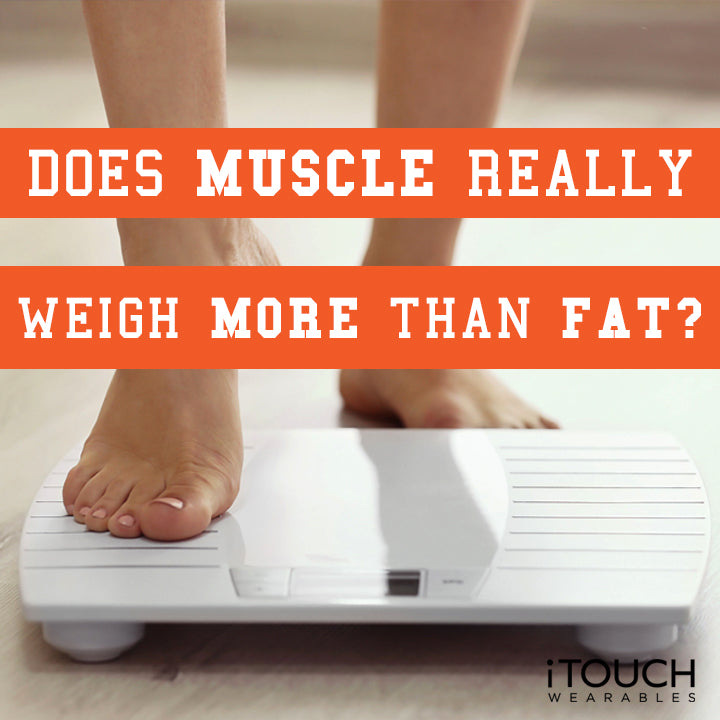
Does Muscle Really Weigh More Than Fat?
There is an age old myth within the fitness world in which it is believed that muscle weighs more than fat. How it started - we aren't sure, but we are here to bust that myth! When you truly think about it, a pound of muscle weighs the same as a pound of fat. That doesn't mean that there isn't good news behind that fact though.
Does Muscle Really Weigh More Than Fat?
Muscle takes up far less volume than fat does, meaning that it takes up much less space within your body, making you look more sculpted in your physique.
If you were to break it down into simpler terms, think about it as this weight: A pound of feathers is light and fluffy, taking up much more room than compared to one pound of steel. Both weigh the same, but the feathers take up more volume than that of the steel. This is how muscle and fat work within our bodies. In learning more about muscle and fat, here is some research we have found.
Overview of Muscle Weight VS Fat Weight

When analyzing muscle weight vs fat weight, you first need to realize that not all pounds are created equally. In fact, just weighing yourself on a scale may not simply be an indicator of your own health - meaning that it cannot indicate how health risks that you may face. In thinking deeper about this, two people of the same weight can be very different from each other, meaning that one person can have significantly more muscle weight while the other could have more fat weight within your body composition.
Muscle and fat also serve very different purposes within the body. Muscle can help protect, support, and move your body. It can also aid in metabolism, meaning that the more muscle you have, the more calories you will be able to burn in rest. In contrast, fat is an insulator, helping to trap heat within the body. While many people believe that fat is a bad thing, having a certain percentage of fat within your body is actually rather beneficial. According to the American College of Sports Medicine, body fat can also serve in storing extra energy within our body, produce sex hormones, and act as a shock absorber for our bones, body tissue, and organs. The American College of Sports Medicine also says that a healthy percentage of fat for the body should be around 10-22% for men and 20-32% for women.
Muscle & Fat Percentages For The Body

Researchers from the Annals of Internal Medicine have said that with low BMI and a high percentage of body fat can be, in the long run, negative for our health in which it can increase mortality. Fat can increase your risk of health-related issues like diabetes, hypertension, and heart disease, and people who even may have a low body weight but a poor muscle-to-fat ratio can have an increased chance of risk from obesity-related diseases.
Knowing your fat percentage is important, but keeping realistic goals about your own body and your own goals is equally as important. According to the American College of Sports Medicine, the percentage of body fat does change from demographic. These are the recommended percentages:
|
Age |
Female (Percentage) |
Male (Percentage) |
|
20-29 |
16-24% |
7-17% |
|
30-39 |
17-25% |
12-21% |
|
40-49 |
19-28% |
14-23% |
|
50-59 |
22-31% |
16-24% |
|
60+ |
22-33% |
17-25% |
Testing your body fat percentage can be a bit complicated, so we suggest going to a doctor or a gym that has specialized equipment that can provide an exact measurement. You can also buy a body fat scale if you choose to weigh yourself in the comfort of your home.
Measuring Your Waist To Hip Ratio
In a recent study conducted by the World Health Organization, it was found that the waist-to-hip ratio can be an indicator of your physical health. In 2015, 15,000 people within the study measured their WHR, finding that a high WHR correlates to an increased rate of death. To check your waist-to-hip ratio, first, measure the smallest part of your waist, then measure around the largest part of your hips and butt. Divided the circumference of your waist by your hips. According to the World Health Organization, your WHR should be .90 or less for women and .85 or less for men.
Tips for Gaining Muscle & Losing Fat

If you are trying to gain more muscle, try out these tips:
- Practice strength training exercises for three or four days a week
- Try incorporating strength training exercises into your cardio work for a high-intensity training
- Do not be afraid to push yourself with increased weights if you feel ready for it
- Consider working with a trainer to create a more proficient workout
- Eat a high-protein diet to help aid in gaining muscle
If you are trying to lose more fat, try out these suggestions:
- Eat a balanced and full-diet that focuses on increasing your intake of fruits, vegetables, and lean proteins.
- Avoid overeating to ensure you are not going over your calorie intake
- Try incorporating a workout into your daily life, working out everyday
- Work with a doctor if you aren't getting the results you want
With this research, we hope to have debunked the myth of muscle weighing more than fat. If you want to make healthier choices, note that it does start with your mental health. Do not get caught up with what it says on the scale! At the end of the day, learn to love yourself and make more positive changes within your life to create a happier and healthier lifestyle.
Share with us more fitness myths you want us to try to debunk by tagging us on Instagram @itouchwearables and Facebook @itouchwearables. Also, be sure to check out our new articles published daily!
-Patrick


